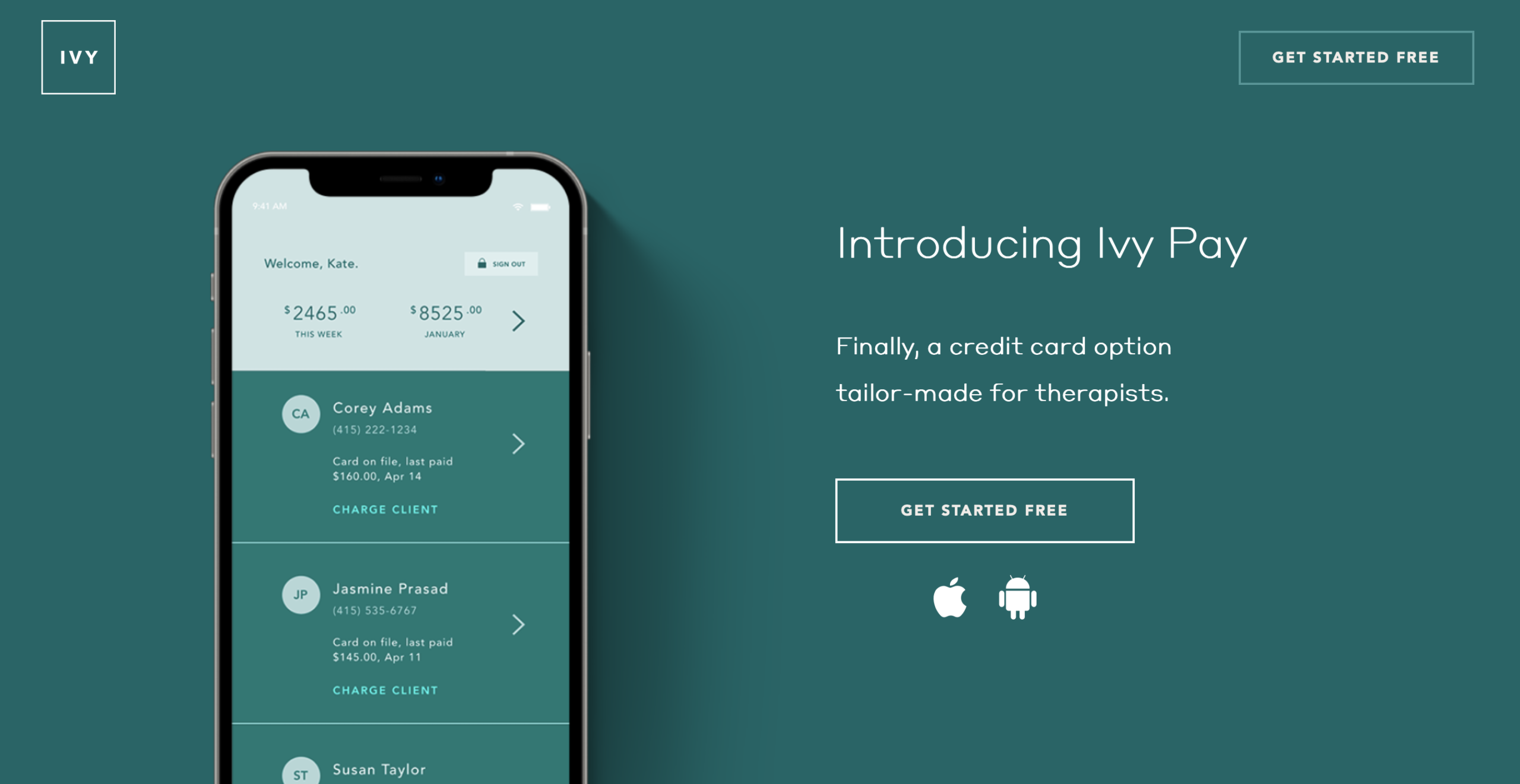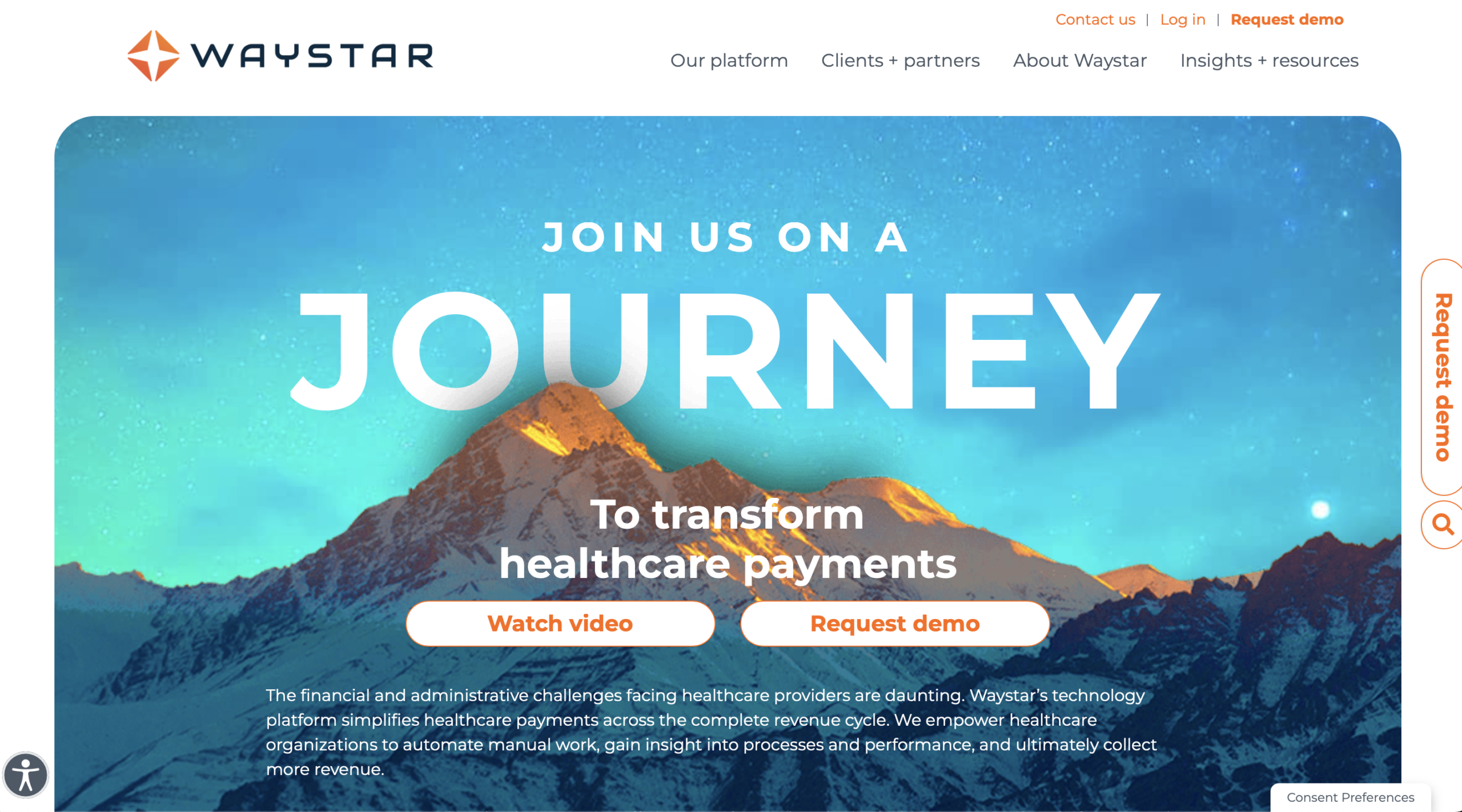Any information related to payment processing that is used or transmitted in connection with a patient’s health condition or treatment could be identified as PHI or protected health information. In such cases, those providing payment processing services to covered entities must also adhere to HIPAA guidelines.
By default, HIPAA does not cover the typical credit card processing, but that might not always be the case. Suppose a payment processor provides other services like invoicing and medical billing. That makes them obliged to follow the law’s regulations as business associates.
Here’s the thing. Finding a payment processing service that’s HIPAA compliant requires research and due diligence. Luckily, you can spare yourself the hassle by checking our list below.
5 Top-Rated HIPAA-Compliant Payment Processing Solutions:

1. Ivy Pay
Although initially designed for therapists, Ivy Pay provides secure and convenient healthcare payment processing. Upon request, healthcare providers can get a Business Associate Agreement (BAA) if needed. It also utilizes strong TLS encryption and validation certificates.

2. Square
For secure healthcare transactions, Square can be your business partner. It is a widely used e-commerce tool that is also HIPAA-compliant. Like Ivy Pay, this HIPAA-compliant payment processing service is willing to enter into a BAA with its clients. On top of that, it lets you change or customize your payment forms within the app.

3. HealthPay24
HealthPay24 is also a reliable and HIPAA-compliant payment platform. With it, medical providers can collect self-payments from patients. The payment processing solution also utilizes PCI-validated point-to-point encryption for added PHI security.
4. PaymentCloud
With a high merchant account approval rate, PaymentCloud can easily integrate with most online payment processing software. It is also HIPAA compliant and can cater to the specific needs of those in the healthcare industry.
5. Dharma Merchant Services
As a HIPAA-compliant payment platform, Dharma Merchant Services caters to healthcare, veterinary, and medical merchants. It secures all its payments using Secure Sockets Layer (SSL) 128-bit encryption.

Key Features of HIPAA-Compliant Payment Processing Solutions
Online payment processors are vulnerable to identity theft, phishing, and fraudulent transactions. However, you can remain safe and HIPAA compliant by discerning whether the payment processor can provide the necessary security measures and other key features.
Business Associate Agreements (BAAs)
A BAA is an agreement between the healthcare organization and a third-party payment provider. It indicates the responsibilities of both parties regarding the transfer of PHI during billing and payments. Thus, any HIPAA-compliant payment solution must be willing to sign a BAA.
Up-to-Date Encryption
Your payment processor must employ up-to-date 256-bit AES encryption. Moreover, it should also include point-to-point encryption and PCI-validated point-to-point encryption (P2PE). These are encryption standards set by the Payment Card Industry (PCI) Security Standards Council, which requires payment data to be encrypted immediately and securely transported to the payment terminal.
EMV Chip Technology
Another must-have feature for HIPAA-compliant payment processing solutions is EMV (Europay + MasterCard + VISA) chip support. Most modern credit cards are powered by EMV chip protection technology. However, not all payment processors or POI terminals have it. With EMV chip technology, you can lower the risk of counterfeit fraud.
Payment Security API
A payment API must securely link the patient and their form of payment (e.g., credit card, bank transfer) to the medical provider. Having a reliable payment security API reduces fraud risk and improves security through payment authentication.
Audit Logs
As per HIPAA, covered entities must undergo risk assessments and have audit trails in hand for review. Likewise, HIPAA compliance payment processing involves comprehensive payment logs stating every healthcare transaction in detail.
Benefits of Using HIPAA-Compliant Payment Processing Services
Simply put, HIPAA-compliant payment processors can drastically improve patient experience. Using a secure payment gateway also makes it easy and safe for you to store and collect payment information.
While there are several reasons why you need to ensure HIPAA compliance, here are the top advantages of choosing a HIPAA-compliant payment processing solution.
- Seamless checkout experience. You can save time by automating the payment process, especially for recurring payments like insurance.
- Heightened security. With proper authentication and encryption, HIPAA-compliant payment solutions offer improved security while minimizing the risk of fraud.
- Regulatory compliance. A reliable payment provider ensures you comply with the latest compliance regulations and requirements.
Secure Transactions With the Right Payment Gateway
Nowadays, only a few people prefer paying with cash and check. Credit cards and digital wallets have become the preferred payment method, catering to diverse client preferences. As a healthcare provider, protecting PHI while ensuring efficient payment management is an absolute necessity.
With HIPAA compliance, you are at ease knowing that your payment processor has met all the requirements to safeguard a patient’s information against unauthorized access or breaches. More importantly, you can avoid facing the consequences of non-compliance.







